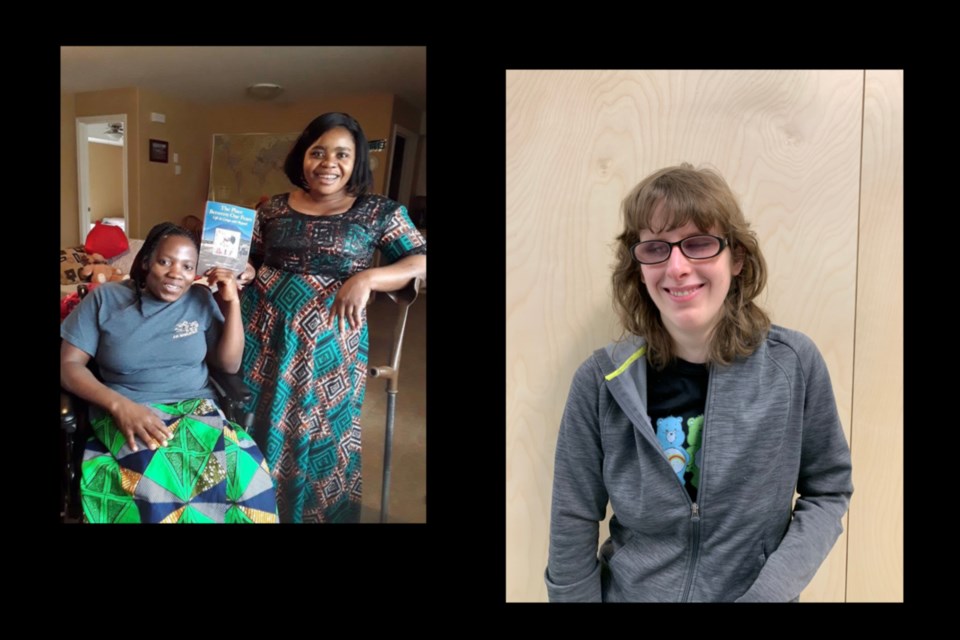ATHABASCA — For the majority of people, dealing with the pandemic is an annoyance, something to grumble about walking back to the car for a forgotten mask.
For others is has created far greater challenges, forcing some to deal literally with unseen changes, or learning new things out of necessity. Serena Johnson sees the world differently, but the pandemic has taken away her sight, and for Argentine Imanirakunda and Mapendo Ndongotsi they have had to learn new skills to keep running their business.
Imanirakunda, 33, and Ndongotsi, 34, came to Athabasca four years ago leaving their war-torn home of Congo, and the challenge for them has been learning new skills like sending e-transfers or e-mailing, while they continue to learn English.
“For some things, I think, I'm feeling a little bit stronger because before I can't even know how to open an e-mail,” Imanirakunda said. “I can know ‘Oh that is time for Zoom’ and I go on my computer and open it. I don't need to call someone for help.”
The two women run SHONA Congo/SHONA Canada, an online business selling aprons, reusable bags and purses and masks they make using vibrant African fabrics, so they learned to print shipping labels and other technology to keep in touch with friends and family because it is very expensive to call Congo.
“Sometimes on What's App or social media to talk to our parents,” Ndongotsi said.
For now, they continue to learn English using Zoom with staff from Words Work and since Ndongotsi’s husband Joseph got his licence they have some freedom to travel.
Johnson and her twin brother were born prematurely at 24 weeks, and while the oxygen kept her alive, it stole her sight. She also had a Grade 4 cerebral bleed which left her with cerebral palsy and while she continues to manoeuvre through the world, the pandemic has taken away her extended ‘sight — her sense of touch.
“Touch and hearing are my main ways of telling anything,” she said in a recent interview. “If I'm not allowed to touch things or shake somebody's hand there's a lot of information that just doesn't get to me.”
And while the 24-year-old is missing out on physical contact, she is still attending King’s University majoring in English in a hybrid program with both at-home and in-person classes, but the technology hasn’t caught up to her challenges.
“My contact with people is basically limited to Zoom classes or the two days of in-person classes, which the in-person is way better because I'm actually able to talk to people.” she said. “On the Zoom classes it seems like half the class doesn't talk and there's no conversation really.”
And if they communicate through the chat feature Johnson’s computer may or may not be able to pick it up and read it to her.
“The few times when it has read the chat, it talks over the teacher so, that doesn't help matters at all.” she said.
Being with family helps, like visiting her aunt Christine Onysty in Athabasca, or when the Onystys travel to Sherwood Park.
“Serena is my niece, on my husband's side of the family. We spend lots of time together at her place and ours up here in Athabasca,” Onysty said in an e-mail. “Did she (say) she's an honours student at Kings University? I'm pretty proud of her accomplishments, and (she) gives my daughter someone to look up to.”
Getting around before the pandemic was an issue, mostly she found because a lot of people don’t recognize her white cane as being an aid.
“I think we do need to do more work on (education) because often people don't know what the cane even is,” said Johnson. “They don't realize that I'm not just waving this stick around on the ground. ‘I’m trying to walk. Move!’”
Johnson said the world no longer feels familiar, saying she wanted to ‘go home’ and when asked what that meant explained it’s like everything is upside-down and needs to be made right.
“None of this environment now really feels like home and I'm just not comfortable with the way the world has turned,” she said. “It's gone from being in a fairly friendly place to something really intimidating that I just wish I didn't have to experience.”



